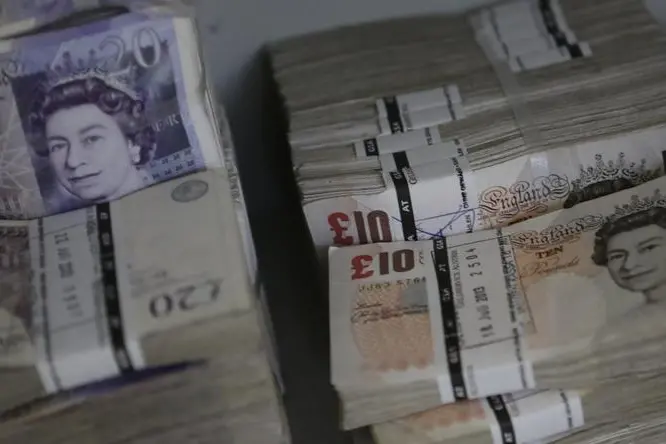PHOTO
By Jemima Kelly
LONDON, Sept 30 (Reuters) - Sterling stayed below $1.30 on Friday and was on track for a fifth consecutive quarter of losses - the currency's worst run since 1984.
The pound plunged to a 31-year low after Britain voted to leave the European Union, falling as low as $1.28
Sterling is now trading more than 40 U.S. cents - or 25 percent - lower than the six-year highs it reached in mid-2014, as expectations for the Bank of England to hike interest rates have dried up.
Last month the BoE cut its key interest rate to another record low and relaunched an asset-purchase programme in an effort to cushion the blow dealt by the vote for Brexit, and some expect it to ease policy again before the end of the year.
Data released early on Friday showed British consumer morale rocketed back to pre-Brexit levels in September, confounding expectations that the vote to leave the EU would wreak more lasting damage on Britons' willingness to spend.
"The good news is that from the perspective of UK consumers, the Brexit shock has been fleeting," wrote Bank of Tokyo-Mitsubishi UFJ currency strategist Derek Halpenny.
"Less good was the Lloyds Business Barometer Index, which did increase but remains well below the pre-Brexit level and understandably reflects the ongoing concerns over how business with Europe will be conducted going forward."
Sterling traded down 0.1 percent on the day by 0805 GMT at $1.2954, ahead of second-quarter GDP data due at 0830 GMT. It was on track for an almost 3 percent quarterly loss.
Against the euro, which was down against most currencies on the back of worries about the health of Deutsche Bank, one of Europe's biggest lenders, sterling climbed a third of a percent to 85.26 pence
Next week, manufacturing and production data should provide indicators of the health of the British economy.
"So far, data have suggested that various worst-case scenarios in the aftermath of the referendum have not materialised," wrote BNP Paribas strategists in a research note.
"However, MPC (monetary policy committee) members have signalled that they continue to expect a need for further easing later this year, and our economics team expects data to paint a picture of an economy that has effectively stalled. We view the sterling as still vulnerable, and expect it to hold below $1.30 despite broader dollar weakness."
(Editing by Dominic Evans) ((jemima.kelly@thomsonreuters.com; +44)(0)(20 7542 7508; Reuters Messaging: jemima.kelly.thomsonreuters@reuters.net))
LONDON, Sept 30 (Reuters) - Sterling stayed below $1.30 on Friday and was on track for a fifth consecutive quarter of losses - the currency's worst run since 1984.
The pound plunged to a 31-year low after Britain voted to leave the European Union, falling as low as $1.28
Sterling is now trading more than 40 U.S. cents - or 25 percent - lower than the six-year highs it reached in mid-2014, as expectations for the Bank of England to hike interest rates have dried up.
Last month the BoE cut its key interest rate to another record low and relaunched an asset-purchase programme in an effort to cushion the blow dealt by the vote for Brexit, and some expect it to ease policy again before the end of the year.
Data released early on Friday showed British consumer morale rocketed back to pre-Brexit levels in September, confounding expectations that the vote to leave the EU would wreak more lasting damage on Britons' willingness to spend.
"The good news is that from the perspective of UK consumers, the Brexit shock has been fleeting," wrote Bank of Tokyo-Mitsubishi UFJ currency strategist Derek Halpenny.
"Less good was the Lloyds Business Barometer Index, which did increase but remains well below the pre-Brexit level and understandably reflects the ongoing concerns over how business with Europe will be conducted going forward."
Sterling traded down 0.1 percent on the day by 0805 GMT at $1.2954, ahead of second-quarter GDP data due at 0830 GMT. It was on track for an almost 3 percent quarterly loss.
Against the euro, which was down against most currencies on the back of worries about the health of Deutsche Bank, one of Europe's biggest lenders, sterling climbed a third of a percent to 85.26 pence
Next week, manufacturing and production data should provide indicators of the health of the British economy.
"So far, data have suggested that various worst-case scenarios in the aftermath of the referendum have not materialised," wrote BNP Paribas strategists in a research note.
"However, MPC (monetary policy committee) members have signalled that they continue to expect a need for further easing later this year, and our economics team expects data to paint a picture of an economy that has effectively stalled. We view the sterling as still vulnerable, and expect it to hold below $1.30 despite broader dollar weakness."
(Editing by Dominic Evans) ((jemima.kelly@thomsonreuters.com; +44)(0)(20 7542 7508; Reuters Messaging: jemima.kelly.thomsonreuters@reuters.net))





















